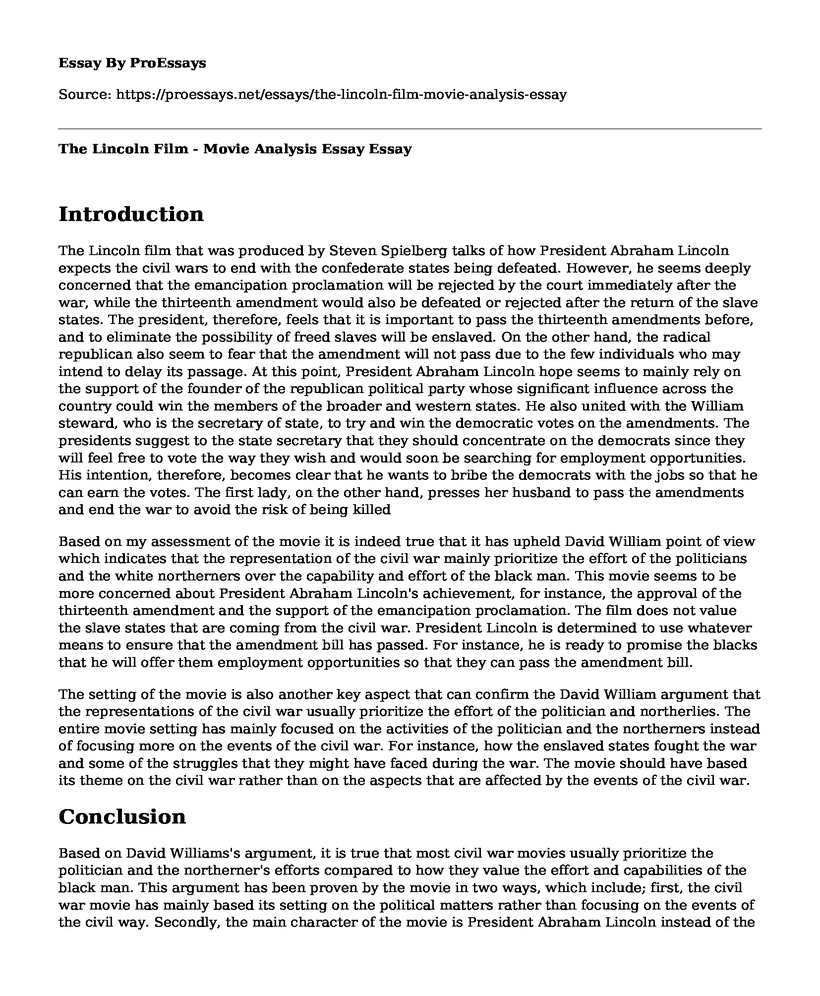Introduction
The Lincoln film that was produced by Steven Spielberg talks of how President Abraham Lincoln expects the civil wars to end with the confederate states being defeated. However, he seems deeply concerned that the emancipation proclamation will be rejected by the court immediately after the war, while the thirteenth amendment would also be defeated or rejected after the return of the slave states. The president, therefore, feels that it is important to pass the thirteenth amendments before, and to eliminate the possibility of freed slaves will be enslaved. On the other hand, the radical republican also seem to fear that the amendment will not pass due to the few individuals who may intend to delay its passage. At this point, President Abraham Lincoln hope seems to mainly rely on the support of the founder of the republican political party whose significant influence across the country could win the members of the broader and western states. He also united with the William steward, who is the secretary of state, to try and win the democratic votes on the amendments. The presidents suggest to the state secretary that they should concentrate on the democrats since they will feel free to vote the way they wish and would soon be searching for employment opportunities. His intention, therefore, becomes clear that he wants to bribe the democrats with the jobs so that he can earn the votes. The first lady, on the other hand, presses her husband to pass the amendments and end the war to avoid the risk of being killed
Based on my assessment of the movie it is indeed true that it has upheld David William point of view which indicates that the representation of the civil war mainly prioritize the effort of the politicians and the white northerners over the capability and effort of the black man. This movie seems to be more concerned about President Abraham Lincoln's achievement, for instance, the approval of the thirteenth amendment and the support of the emancipation proclamation. The film does not value the slave states that are coming from the civil war. President Lincoln is determined to use whatever means to ensure that the amendment bill has passed. For instance, he is ready to promise the blacks that he will offer them employment opportunities so that they can pass the amendment bill.
The setting of the movie is also another key aspect that can confirm the David William argument that the representations of the civil war usually prioritize the effort of the politician and northerlies. The entire movie setting has mainly focused on the activities of the politician and the northerners instead of focusing more on the events of the civil war. For instance, how the enslaved states fought the war and some of the struggles that they might have faced during the war. The movie should have based its theme on the civil war rather than on the aspects that are affected by the events of the civil war.
Conclusion
Based on David Williams's argument, it is true that most civil war movies usually prioritize the politician and the northerner's efforts compared to how they value the effort and capabilities of the black man. This argument has been proven by the movie in two ways, which include; first, the civil war movie has mainly based its setting on the political matters rather than focusing on the events of the civil way. Secondly, the main character of the movie is President Abraham Lincoln instead of the black individuals from the enslaved states.
Cite this page
The Lincoln Film - Movie Analysis Essay. (2023, Mar 14). Retrieved from https://proessays.net/essays/the-lincoln-film-movie-analysis-essay
If you are the original author of this essay and no longer wish to have it published on the ProEssays website, please click below to request its removal:
- Tempting Fate: Everest Essay
- Political Speeches of of the Greatest Roman Writers and Politician Paper Example
- Film Analysis Essay: Schindler's List
- Essay Sample on Press Freedom in Afghanistan
- Essay Sample on The Carringtons & Colbys: A Netflix Dynasty
- Split - Movie Analysis Essay
- Streetcar Named Desire by Tennessee Williams - Essay Sample







